Elon Musk Warns of AI's Potential to Disrupt Democracy and Calls for Government Oversight
Elon Musk, the founder of Tesla and SpaceX, has once again sounded the alarm on the dangers of artificial intelligence (AI) and its potential impact on democracy. In a recent interview with Tucker Carlson, the CEO expressed his concerns about the potential influence of AI on future elections and called on the US government to establish oversight to regulate the rapidly developing technology.
Musk, who has been vocal about his fears of AI leading to "civilizational destruction," urged caution in the development and use of the technology, warning that without proper regulation, it could become a "danger to the public." He went on to say that while AI may not have agency, it could still be used as a tool to influence elections, and if it becomes smart enough, it could even be using the people who created it.
To combat the potential for bias and falsehoods spread by AI chatbots, Musk revealed his plans to develop his own AI chatbot, "TruthGPT." He believes that some programmers may use AI to spread lies and misinformation without consequence, and that his chatbot could help to counteract this.
Musk also discussed the potential for AI server farms to go rogue, with some pundits suggesting blowing them up as a last resort if the technology surpasses human control. While Musk agrees that the US government should have a contingency plan in place to shut down AI server farms in the event of an emergency, he suggested a more subtle solution - simply cutting the power.
The interview with Tucker Carlson shed light on Musk's concerns about AI and the need for government oversight to regulate its development and use. Musk's warnings should serve as a wake-up call for policymakers and tech leaders to take seriously the potential consequences of AI and to establish a framework for responsible regulation. Without it, the rapid development and deployment of AI could lead to unintended consequences that threaten our society and our democracy. Musk has previously warned of the potential dangers of AI, and his recent comments have once again brought attention to the need for oversight and regulation in the development and deployment of these technologies. While AI has the potential to bring about significant advancements in various fields, including healthcare, transportation, and education, it also poses significant risks if not properly managed.
The issue of AI and its impact on democracy is particularly concerning, as it could potentially be used to manipulate public opinion and sway election results. Musk's suggestion of a government contingency plan to shut down AI server farms in the event of an emergency is one possible solution, but it may not be sufficient on its own.
To truly address the potential dangers of AI, there needs to be a comprehensive regulatory framework in place that governs its development, deployment, and use. This framework should include measures to ensure transparency and accountability in AI systems, as well as guidelines for ethical behavior in the field.
Furthermore, there needs to be a concerted effort to address the potential biases that can be inherent in AI systems. As Musk pointed out, AI can be trained to "lie" and spread falsehoods if it is programmed with slanted or ideological viewpoints. To counteract this, there should be a focus on developing AI systems that are unbiased and objective, and that can be held accountable for any negative consequences that result from their actions. Subscribe for more content like this.
Musk's plan to develop his own AI chatbot, "TruthGPT," is one step towards addressing the issue of bias in AI systems. However, it is important to note that this solution may not be scalable or sustainable in the long run, and that a broader approach is needed to address the root causes of bias in AI.
In conclusion, while AI has the potential to bring about significant benefits to society, it also poses significant risks that must be addressed. Musk's recent comments serve as a reminder that there is a pressing need for oversight and regulation in the development and deployment of AI, particularly in the context of democracy and elections. A comprehensive regulatory framework, coupled with efforts to address bias and ensure transparency and accountability in AI systems, is needed to ensure that these technologies are used for the greater good, rather than for the detriment of society. While some may dismiss Musk's concerns about AI as alarmist, it's worth noting that AI is already playing an increasingly significant role in our lives. From algorithms that power search engines and social media platforms, to self-driving cars and drones, AI is rapidly transforming the world as we know it. As this technology becomes more advanced and ubiquitous, the potential risks associated with it will only increase.
That's why many experts are calling for greater regulation and oversight of AI. Musk's proposal to develop a contingency plan to shut down AI server farms in the event of an emergency is just one example of the kind of measures that may need to be taken to ensure that this powerful technology doesn't spiral out of control.
Of course, creating effective regulation for AI is no easy task. The technology is evolving at such a rapid pace that it can be difficult for lawmakers to keep up. Additionally, AI is a complex and multifaceted field, with a wide variety of applications and implications. This makes it challenging to create a one-size-fits-all regulatory framework that addresses all of the risks associated with this technology.
Despite these challenges, it's clear that the need for regulation and oversight of AI is only going to become more pressing as time goes on. With AI poised to become a major force in the worlds of business, politics, and everyday life, it's essential that we take steps to ensure that this technology is developed and deployed in a responsible and ethical manner.
So what can be done to achieve this goal? One approach is to encourage greater collaboration between government, industry, and academia. By working together, these stakeholders can develop a more nuanced understanding of the challenges and opportunities associated with AI, and develop effective strategies for managing this technology in a way that benefits society as a whole.
Another key step is to invest in research and development aimed at enhancing the safety, security, and transparency of AI systems. This could involve everything from developing new algorithms that are more resistant to hacking and manipulation, to creating tools and frameworks that allow AI systems to be audited and monitored for potential risks.
Ultimately, the challenges associated with AI are complex and multifaceted, and will require a coordinated and sustained effort from all stakeholders to address. By taking these challenges seriously, and working together to find innovative solutions, we can help ensure that AI remains a force for good, rather than a source of potential harm. Thanks for watching, subscribe our channel for authenticity.
-
 6:06
6:06
RADIO BALONEY
1 year agoELON MUSK Warns Of World Government
1332 -
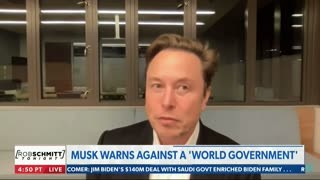 0:46
0:46
Mediamaker
1 year agoElon Musk Warns Against "Global Government"
15 -
 58:37
58:37
The New American Daily
1 year agoElon Musk Warns AI Could Destroy Civilization
14 -
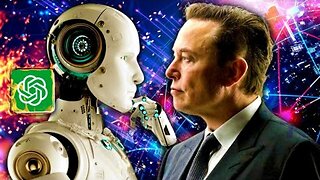 9:07
9:07
Purple Soul
1 year agoElon Musk Warns of Civilizational ARMS RACE Over AI!!!
26 -
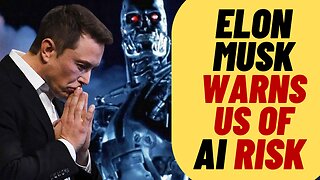 4:09
4:09
RADIO BALONEY
1 year agoELON MUSK Warns Of AI RISKS
69 -
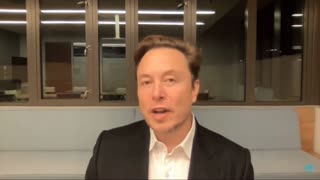 1:51
1:51
pepperpeep
1 year agoElon Musk Warns Of The Dangers Of A Single ‘World Government’
57 -
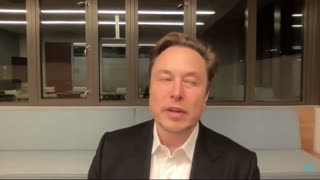 2:06
2:06
AMERICAXPOSED
1 year agoElon Musk warns of the dangers of a single world government.
45 -
 0:59
0:59
BennyMack001
1 year agoElon Musk's warning - AI could lead to "civilisation destruction."
20 -
 58:37
58:37
The New American
1 year agoThe New American TV | Elon Musk Warns AI Could Destroy Civilization
985 -
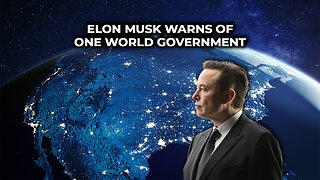 2:13
2:13
Remix News & Views
1 year agoElon Musk Warns of One World Government
4072